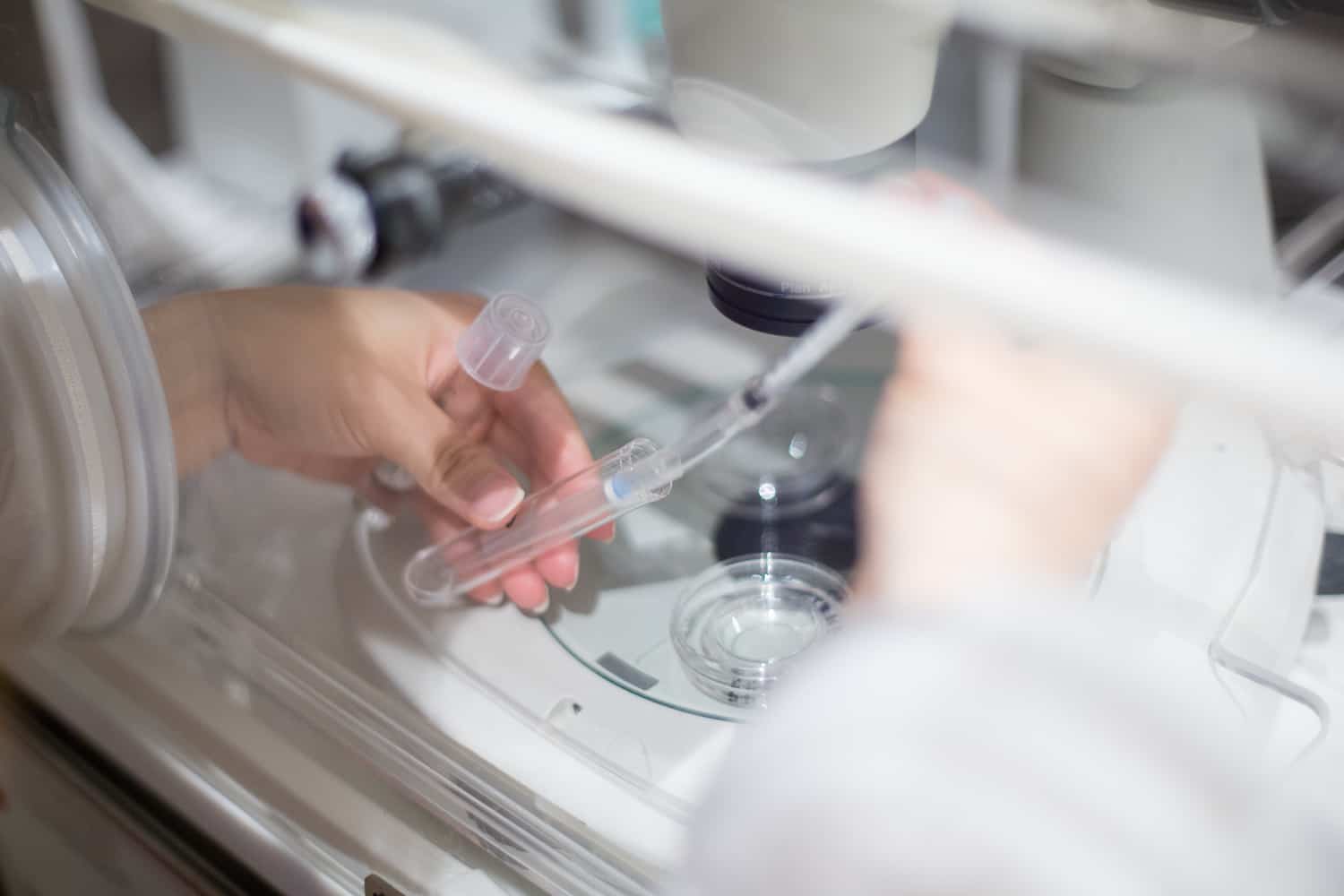Problems with male fertility are based around sperm, whether the quantity or the quality. As sperm does all the hard work for conception - swimming through the female reproductive tract, finding the egg, and penetrating its outer layers, the health of your sperm is critical for success.

Morphology (sperm shape and size)
Motility (the ability of sperm to swim)
Sperm concentration
Semen volume
pH of your semen
sperm DNA damage through a Halosperm assay
Depending on the results of your basic semen analysis, we may recommend further investigations, including:
To analyse hormones relevant to sperm production, including testosterone, follicle-stimulating hormone, luteinising hormone, thyroid hormone, and prolactin
Including ultrasound of your scrotum, prostate, or seminal vesicles
To look for antibodies in your semen that mistakenly attack sperm

The male reproductive system includes several components, including the testicles, which produce sperm that are transported via the vas deferens tube to the urethra, the tube in the penis, for ejaculation during intercourse.
Anatomical problems that can interfere with fertility include having a blocked or missing vas deferens, variocele (enlarged veins in the scrotum), or impaired function of any part of your reproductive organs from injury, trauma, or infection.
When discussing your treatment options, we may recommend surgery to fix the problem and improve your chances of conceiving naturally, or we may advise you to consider assisted reproductive technologies like IVF.
Hormones play an integral role in many systems and functions of your body, including reproduction. Abnormal hormone levels can be responsible for interfering with your sperm production. Disruptions to your hormones can be due to congenital conditions, trauma, drugs and medications, infections, or systemic conditions.
Managing endocrine (hormone) imbalances in infertility can be complex. Dr Anne Clark has completed advanced training in reproductive medicine with a Certificate of Reproductive Endocrinology and Infertility, so you know you’re receiving true expert advice.
Discussing sexual performance can be a challenging and sensitive topic - but rest assured, you’re in a safe, non-judgmental space at Fertility First where we treat all our patients with dignity.
Functional problems relating to male infertility can include erectile dysfunction and premature ejaculation. Certain systemic conditions, such as diabetes and multiple sclerosis can also increase your risk of experiencing sexual performance issues and infertility.
Before deciding on treatment, we perform investigations to uncover the underlying reasons. This includes an assessment of your overall health, even cardiovascular health, a review of your current and recent medications, and a physical exam.
To schedule a semen analysis, Halosperm assay, or HBA test, please call Fertility First on (02) 9586 3311 or fill out our online contact form. We offer appointments throughout the week to accommodate your schedule. Please note that appointments must be made at least 2 days in advance due to preparation requirements.
To ensure accurate results, please abstain from ejaculation for 2-7 days before your appointment. Sufficient semen volume is required to perform all tests.
Please note that the reagents required to perform the assays are very expensive and must be prepared the day prior to your test. A cancellation fee of $450 will be applied if your appointment is cancelled with less than 24 hours notice to the laboratory. Here is a full list of Fertility First costs.
We routinely recommend the Halosperm assay, which is used to assess the fertility potential of your sperm by determining the percentage of sperm that contain fragmented and damaged DNA. The Halosperm assay provides invaluable information about the quality of the DNA inside your sperm’s chromosomes and helps to guide our recommendations for treatment.
The chromosomes in your sperm make up half of your future child. Fragmented DNA in sperm is DNA which is “broken” in one or more areas. The higher the percentage of sperm with DNA fragmentation, the lower the chance of natural conception or success with fertility treatment, and the higher the risk of miscarriage (up to 4 times higher risk) if a pregnancy does occur.
When the Halosperm assay is performed in conjunction with a standard semen analysis, we get a better overall picture of the likelihood of the sperm being a factor in your fertility problems. A standard semen analysis is only useful for determining the transport aspects of sperm, that is, how many there are, how well they move and whether they are a normal shape. The Halosperm assay provides invaluable information about the quality of the DNA inside the sperm and therefore what the sperm can do when it gets inside the egg.
Having the Halosperm assay is not mandatory for male fertility testing, but at Fertility First we make a point to offer it so all our patients at least have the option to access a more comprehensive assessment of their fertility.
An abnormal test result does not mean that you cannot have children. It simply enables us to determine the best form of fertility treatment for you. We may also recommend lifestyle changes and antioxidant therapies.
Our studies have shown that more than 75% of patients who make changes to their lifestyle and take the recommended dietary supplements have a reduction in DNA fragmentation after approximately 2 months. A significant number of these patients go on to conceive naturally and the miscarriage rate is dramatically reduced (less than 5%). For more information on lifestyle changes you can make to improve your fertility, visit this page.
Antibodies are proteins of the immune system that are designed to attach to a specific substance or organism which the body identifies as “foreign”. When the body detects a foreign organism, white blood cells will release antibodies into the bloodstream, which will then attach to the “foreigner”. Some antibodies will destroy the foreigner while others will act as beacons to direct the body’s other defence mechanisms to the scene.
In men, the organs that produce and store the sperm (the testes and the epididymis) are protected environments and as a result, sperm are not usually detected or destroyed by the body’s immune system. However, after an infection, physical damage, or an operation such as a vasectomy, the protective layer can become less effective, the body will detect the “foreign” sperm, and antibodies will be produced.
Both women and men can produce antisperm antibodies (ASABs), which can contribute to fertility problems by:
If you or your partner test positive for ASABs, the best fertility treatment option is usually with intracytoplasmic sperm injection (ICSI). Multiple studies have demonstrated that ICSI is able to offer the same success rates in these cases as that for couples unaffected by ASABs.
While there’s no guaranteed way to improve sperm health, lifestyle changes and medical interventions can help. Maintaining a healthy weight, avoiding excessive alcohol and tobacco use, and reducing stress can improve overall reproductive health and sperm quality.
Consuming a balanced diet rich in antioxidants, vitamins, and minerals can also support sperm health, while regular physical activity can improve circulation and overall wellbeing. In some cases, medications can address underlying medical conditions that affect sperm production or function. Treating infections of the reproductive tract can also help improve sperm health.
At Fertility First, our fertility specialists will assess your individual situation and recommend appropriate steps to improve sperm health and increase your chances of natural conception.
Following your initial consultation, we will schedule an appointment with our laboratory for semen testing. We aim to have your results back within 2 to 3 weeks.

Insufficient sperm count may be associated with dietary and lifestyle factors, including zinc deficiency, vitamin inadequacy, smoking, and even choice of underwear. Incorporating healthy dietary changes is a valuable strategy for enhancing both the quality and quantity of sperm.

Almost a third of fertility problems can be attributed to male factor and the most common causes of fertility issues with men range from sperm quality and quantity to problems relating to the delivery of the sperm such as the absence of the vas deferens and ejaculatory duct obstruction.

Further research from the University of Georgia has revealed that in severe cases of men infected with COVID-19, testicular function may be impaired, therefore resulting in a reduction of male fertility.

Fertility First has been testing DNA damage on males for over 15 years and is a contributing factor as to why our pregnancy rates are so positive.